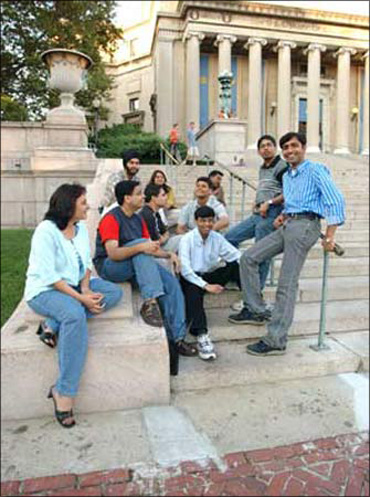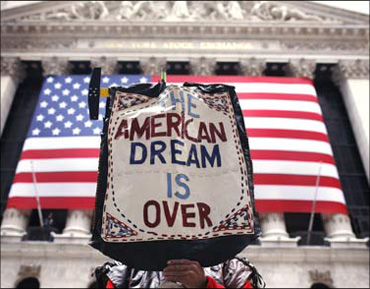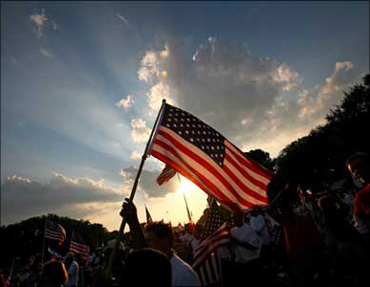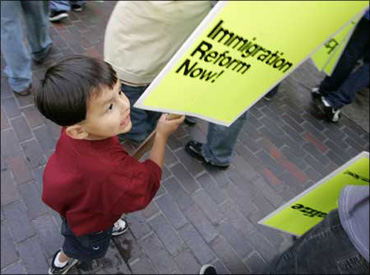Photographs: Paresh Gandhi George Joseph in New York
Several Indians who arrived with an H-1B visa at Newark and John F Kennedy airports were deported based on a new rule, immigration attorneys and activists have reported.
The new rule stipulates that those who arrive on a work visa should work under the petitioner and not at a client's site.
The rule could seal the fate of thousands of Indians who have applied for Green Card too.
It could bring an end to consultation, termed by some as 'body-shopping'. Airport deportations have frightened those on work visas and many have canceled their travel plans, too.
"The airport deportations," Morley Nair, an immigration attorney based in Philadelphia, "have sent shockwaves through the H-1B community. H-1B employers, employees and their attorneys alike are flabbergasted by this brazen act of official highhandedness where individuals arriving on H-1B visas were singled out even before their primary immigration inspection, put through sham questioning, forced into making coercive statements, issued expedited removal orders, and sent back." . . .
H-1B visa-holders being deported from port of landing!
Image: A sign at the NYSE depicting the immigrants' plight.Photographs: Reuters
"Their crime? They landed in the United States with legitimate H-1B visas to work for genuine United States employers, but at a location other than the employer's office, that is, at a client site or third party site," he said.
"Over 50 to 80 per cent of Indian H-1B visa holders come for a consulting company. Their companies will send them to client sites. The new rule stipulates that the petitioner of the visa should be present at the work place," Aman Kapoor, founder of Immigrationvoice, an organisation working for H-1B visa holders and green card applicants, said.
Kapoor said the number of airport deportations were few as the memo from Donald Neufeld, associate director, Service Center Operations of USCIS, was issued only on January 8. But overzealous officers at airports began to use it in no time.
H-1B employees working at a client site or a third party site is a practice as old as the H-1B programme itself, and is not a violation of the regulations when supported by appropriate documentation, Nair said. "What is shocking is the disgraceful action by the Customs and Boarder Patrol inspectors was triggered by an overzealous interpretation of the memo," he noted. . . .
H-1B visa-holders being deported from port of landing!
Image: The American flag is waved at a rally organised by protesting immigrants.Photographs: Reuters
The Neufeld memo underlines the requirement of an employer-employee relationship that would last the entire period of the foreign individual's H-1B stay in the United States. In such a relationship the employer should have the 'actual' control or the 'right' to control the employee, to hire, fire, pay, and to decide when, where, and how the employee will be employed.
The focus of the CBP enforcement action is on who the actual employer is. In situations where an individual works at a location different from the petitioning employer's office, the question is whether such petitioner employer has the 'actual' control or the 'right' of control over the H-1B employee.
When the H-1B employee works at a client site, or a third party site, the H-1B petitioner may not always be able to exercise 'actual' control over the individual's employment. But to maintain the H-1B status and be in compliance with the regulations, the petitioner needs to prove the 'right' to control, if not the 'actual' control.
This situation can be addressed with a little foresight, logical planning, and preparation and maintenance of appropriate documentation. Also, H-1B employees should be educated on how to answer questions from overbearing government officials, Nair noted. "Pardon me for saying this, a small minority of employers, through a lackadaisical attitude towards adhering to the regulations, seem to bring a bad name to the entire H-1B community and to the H-1B programme itself, resulting in such sweeping governmental actions that affect legitimate H-1B employers and put the unsuspecting employees and their families in jeopardy," he said. . . .
H-1B visa-holders being deported from port of landing!
Image: A child holds up a placard at a rally organised by protesting immigrants.Photographs: Reuters
New York attorney Cyrus Mehta explained what happened in Newark in his recent newspaper column. 'On one fateful day, January 11, when Continental Airlines Flight 49 landed in Newark from Mumbai, we know that CBP officer Matt McGirr and his colleagues, hunted through the lines for Indian H-1B workers even before they showed up for primary inspection. Their minds were made up. No detailed questions were asked.'
'The moment they found Indian H-1B workers who uttered that they were working at a client site in the IT field, their fates were sealed. They were subjected to expedited removal (ER) orders and sent back to India. Some were luckier and escaped the ER order, but still had to withdraw their applications for admission to the US.'
'Nevertheless, they were all coerced into making statements under threat of being detained. Officials also made remarks as to why the H-1B workers, earned more than US workers and (said) should not be paid so much.'
When one is sent back by an ER order, he cannot come back for another five years. Those who withdraw their application to enter the United States and go back with their money can come back soon with a new visa stamp or for a new employer. Attorneys have decided to take up the issue with the authorities.





article